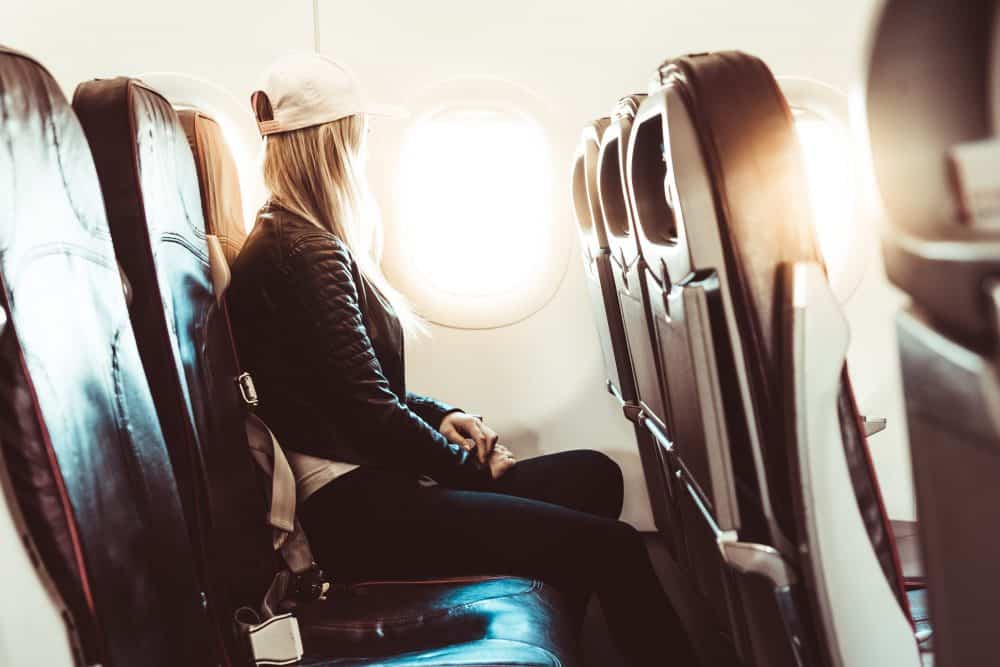Contents
The Dreaded Jet Lag
A Brief Explanation
Jet lag is a temporary sleep disorder that occurs when you travel across multiple time zones without giving your body enough time to adjust to the new schedule. It is caused by disruptions to your circadian rhythm, which regulates the timing of sleep and waking cycles in the body. Symptoms of jet lag can include insomnia, fatigue, irritability, headaches, digestive problems and difficulty concentrating.
How it Affects Travelers
Jet lag affects travelers differently depending on their age, health status and travel experience. However, for most people, jet lag is a mood killer that can put a damper on an otherwise enjoyable trip.
Imagine finally arriving at your dream destination only to be so tired that you spend most of the vacation napping or feeling too groggy to fully enjoy activities. Jet lag can also lead to decreased productivity on business trips or make it difficult to connect with local cultures and customs.
The Importance of Overcoming Jet Lag
In order to fully enjoy your vacation or conduct successful business overseas, it’s important to overcome jet lag as quickly as possible. This involves resetting your body’s internal clock by gradually adjusting your sleep schedule before departure and implementing healthy habits during and after the flight. By doing so you’ll be able to hit the ground running upon arrival and maximize every moment of your trip.
So don’t let jet lag get in the way of creating lasting memories from your travels! By following some simple tips and tricks you’ll be able to overcome this common affliction and fully enjoy all that your destination has to offer.
Pre-Trip Preparation
Adjusting Sleep Schedule Before Departure
Jet lag occurs when your body’s circadian rhythm, or internal clock, is disrupted by traveling across multiple time zones. One way to help minimize the effects of jet lag is to gradually adjust your sleep schedule before departing.
This means starting a few days before your trip and gradually shifting your sleep and wake times closer to those of your destination. For example, if you’re traveling from New York to Tokyo, which has a 13-hour time difference, you could try going to bed an hour earlier each night for several nights leading up to your departure.
Staying Hydrated and Avoiding Alcohol and Caffeine Before and During the Flight
Dehydration can exacerbate the symptoms of jet lag, so it’s important to stay hydrated before and during your flight. This means drinking plenty of water in the days leading up to your trip as well as during the flight itself.
It’s also important to avoid alcohol and caffeine as they can both affect sleep quality and make it more difficult for you to adjust to a new time zone. Instead, opt for water or herbal tea during the flight.
Choosing Flights that Minimize Time Zone Changes
One way to minimize the effects of jet lag is by choosing flights that minimize time zone changes. You may want to consider taking a direct flight rather than one with layovers so that you spend less time in transit overall. Additionally, if possible, try scheduling flights so that you arrive at your destination in the late afternoon or evening local time.
This can make it easier for you to adjust since you’ll be able to go straight from the airport into nighttime activities such as dinner or winding down at a hotel spa. By taking these pre-trip preparation steps, such as adjusting sleep schedules before departure, staying hydrated, and choosing flights that limit time zone changes, you can put yourself in a better position to beat jet lag before it even starts.
During the Flight
Staying Active on the Plane
Flights can be long and exhausting, but it’s important to stay active during the flight to prevent jet lag from setting in. Sitting in one position for too long can lead to stiffness and discomfort, making it harder to fall asleep and adjust to the new time zone.
To combat this, be sure to get up and walk around every hour or so. This will get your blood flowing and help keep your body feeling limber.
If walking around isn’t possible due to turbulence or other factors, you can still do light exercises right in your seat. Try lifting your feet off the floor and rotating them in circles for a minute or two.
Or, stretch your arms up towards the ceiling and hold for a few seconds before releasing. These simple exercises can make a big difference in how you feel upon arrival.
Adjusting Sleep Schedule
When traveling across multiple time zones, it’s important to start adjusting your sleep schedule as soon as possible. This means trying to sleep on the plane according to the destination time zone rather than your current one. If you arrive at night, try staying awake on the plane so you’re tired enough to fall asleep at a reasonable local bedtime when you arrive.
One way to help adjust your sleep schedule is by using an eye mask or earplugs. By blocking out distractions like light and noise, you’ll be more likely to fall asleep when you want to.
Natural Remedies for Sleep
If sleeping on planes is difficult for you even with adjustments made according to destination time zones, consider natural remedies like melatonin or lavender oil. Melatonin is a hormone that helps regulate sleep cycles and can be taken as a supplement before bedtime while lavender oil has soothing properties that can promote relaxation.
Before using any natural remedies, always check with your doctor first to ensure they won’t interact with any medication you’re taking or cause any adverse reactions. With proper use, natural remedies can be a helpful tool in overcoming jet lag and getting the restful sleep you need to enjoy your trip.
Upon Arrival
Getting Exposure to Natural Sunlight to Reset Circadian Rhythm
After a long-haul flight, your body clock may be completely out of whack due to the time difference and the fact that you’ve been trapped in an airplane for hours on end. One of the best ways to reset your circadian rhythm is by getting exposure to natural sunlight as soon as possible after arriving at your destination. If it’s daytime, head outside and go for a walk or do some sightseeing.
This will help your brain adjust to the new time zone faster. If it’s nighttime, avoid bright lights and go straight to bed.
Staying Active During the Day and Avoiding Naps
It can be tempting to take a nap when you arrive at your destination if you’re feeling tired or jet lagged, but resist this urge! Taking a nap during the day can prolong jet lag symptoms and make it harder for you to adjust. Instead, try to stay active during daylight hours by doing some gentle exercise like walking or stretching, or simply exploring your new surroundings on foot.
Eating Healthy Meals at Regular Times
Eating healthy meals at regular times is essential for resetting your body clock after traveling across different time zones. Try not to skip meals or eat too much junk food as this can disrupt your sleep patterns even further.
Make sure that you’re eating nutritious meals with plenty of fruits and vegetables so that you have enough energy throughout the day. Additionally, try to eat meals according to local time rather than sticking with what would be meal times in your home country – this will help speed up adjustment times.
Overall, adjusting quickly after arriving at a new destination is key when trying to overcome jet lag so that you can fully enjoy your trip. By taking steps such as getting natural sunlight exposure upon arrival, staying active during the day, and eating healthy meals at regular times, you’ll be able to speed up the adjustment process and make the most of your travels.
Additional Tips and Tricks
Using Technology to Aid in Adjustment
In today’s world, technology is king and there are several apps out there that can help with jet lag. One popular app is Entrain, which helps travelers adjust their circadian rhythm by creating a customized schedule based on their travel plans.
It uses mathematical models to calculate the best times for light exposure and sleep based on your destination’s time zone. Another app is Timeshifter, which creates a personalized plan based on your sleep patterns and travel itinerary.
It also takes into account factors such as caffeine consumption and age. If you’re not into apps, you can also try using a light therapy box.
This device mimics natural sunlight and can help reset your body’s circadian rhythm. Simply use it for 30 minutes each day upon arriving at your destination and continue for at least 4 days to see results.
Packing Comfortable Clothing for Travel Days
One of the most common mistakes people make when traveling is not dressing comfortably enough for long flights or layovers. Make sure you pack loose-fitting clothing that allows for movement such as yoga pants or sweatpants, a comfortable t-shirt or hoodie, and slip-on shoes that can be easily removed during security checks or when boarding the plane.
If you’re someone who easily gets cold on flights, bring an extra layer such as a lightweight sweater or scarf. If you’re traveling to a warmer climate than where you live, pack breathable clothing made of materials such as cotton or linen to stay cool during those hot summer months.
Being Patient with Yourself
Adjusting to a new time zone can take time so it’s important that you don’t get frustrated if things don’t go according to plan right away. Be patient with yourself throughout the process and allow yourself some downtime if necessary.
Take it easy during the first few days and go easy on yourself if you’re not feeling 100%. Avoid scheduling too many activities on your first full day and try to get as much exposure to natural sunlight as possible.
This will help your body adapt to the new time zone and allow you to fully enjoy your trip without feeling exhausted or disoriented. Remember, it’s important to listen to your body and take care of yourself when traveling, especially when it comes to jet lag.
Conclusion
Traveling is a wonderful experience, but jet lag can make it difficult to fully enjoy. By following these simple tips and tricks, you can prepare yourself for your trip and overcome jet lag so that you can have the best experience possible. Remember, everyone is different, so some may adjust quicker than others.
Don’t be too hard on yourself if you don’t immediately feel like yourself after travel. It’s essential to take care of yourself before, during, and after the flight to ease the effects of jet lag.
Preparing your body by drinking plenty of water, avoiding alcohol and caffeine before the flight, and choosing flights that minimize time zone changes will make a significant difference in how quickly you recover from jet lag. During your flight, stay active with light exercises or stretching to improve blood circulation and help reduce stiffness.
When you arrive at your destination, it’s important to get exposure to natural sunlight as soon as possible. Sunlight helps reset your circadian rhythm by signaling your body that it’s time to be awake.
Avoid napping during the day if possible and try to stay active by going for a walk or participating in an activity that will keep you moving. Overcoming jet lag is critical in ensuring that you have an enjoyable trip without feeling exhausted or disoriented.
By implementing these tips into your travel routine, it will help ease any symptoms experienced from traveling long distances across multiple time zones so that you can embrace all that awaits without missing out on anything due to fatigue or discomfort. Happy travels!













